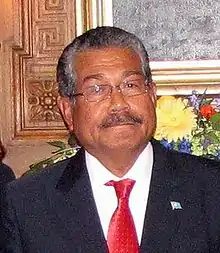Johnson Toribiong
Johnson Toribiong (born 22 July 1946) is a Palauan attorney and politician.[1] Toribiong became the president of Palau, following his victory in the November 2008 election, and left office in 2013.[2] Before 2020 elections, Toribiong has run for president four times - in 1992, 1996, 2008 and 2012.[3]
Johnson Toribiong | |
|---|---|
 | |
| 8th President of Palau | |
| In office 15 January 2009 – 17 January 2013 | |
| Vice President | Kerai Mariur |
| Preceded by | Tommy Remengesau |
| Succeeded by | Tommy Remengesau |
| Personal details | |
| Born | 22 July 1946 Airai, South Pacific Mandate (now Palau) |
| Political party | Independent |
| Spouse | Valeria Toribiong (First Lady) |
| Alma mater | University of Washington, Seattle |
Background and early career
Toribiong was born in Airai, one of the states of Palau. He attended the College of Guam, 1965–66, and holds a Juris Doctor degree (1972) and a Master of Laws (1973) degree from the University of Washington School of Law.[4][5] His LL.M. thesis was entitled, "Oil Pollution by Ships and Micronesia: A Survey of Maritime Jurisdiction and Applicable Laws."[6]
He was elected to the Senate of Palau in 1980. In the 1992 elections; Toribiong attracted 3,188 votes for president, versus 2,084 for one-term incumbent Ngiratkel Etpison and 3,125 for rival Kuniwo Nakamura; however, as no candidate attracted more than 50% of the vote, Nakamura and Toribiong went on to a runoff election, in which Toribiong was defeated.[7]
President
Toribiong was a candidate for president of Palau during the November 2008 presidential election.[8] His running mate for vice president was Kerai Mariur, a delegate in the Palau National Congress.[8] Toribiong was opposed by Elias Camsek Chin, the outgoing Palauan vice president.[8]
Toribiong led the early, unofficial vote tally with 1,629 votes to Chin's 1,499.[8] The lead ultimately held and Toribiong defeated Chin in the election.
Toribiong was sworn into office as president of Palau on January 15, 2009.[9]
Toribiong was defeated in the presidential election of 2012. One of the issues was his acceptance of 6 Uyghur former prisoners at the Guantanamo Bay detention camp, who did not fit into Palauan society.[10]
References
-
"The voters of Palau reject incumbent president". Radio Australia. 2012-11-08. Archived from the original on 2013-11-03. Retrieved 2012-11-15.
While Barack Obama may have won a second term in the White House, there's no such joy in the former US territory of Palau, where voters have thrown out the incumbent president, Johnson Toribiong.
- "Four candidates seek the presidency in Palau elections in 2020". Mbjguam.com. January 19, 2020.
- "Alumni in the News". Law.washington.edu. Retrieved 2008-11-07.
- "Hein's Legal Theses and Dissertations" (PDF). Wshein.com. Retrieved 10 January 2022.
- Hassall, Graham; Saunders, Cheryl (2002), Asia-Pacific constitutional systems, Cambridge University Press, p. 93, ISBN 978-0-521-59129-4
- "Secretary Salazar Meets with Palau President Toribiong March 12, 2009". United States Department of the Interior. 2009-03-12. Archived from the original on April 10, 2009. Retrieved 2009-04-21.
- "After Guantanamo, life on Pacific island was difficult". Theglobeandmail.com. 28 June 2015. Retrieved 10 January 2022.